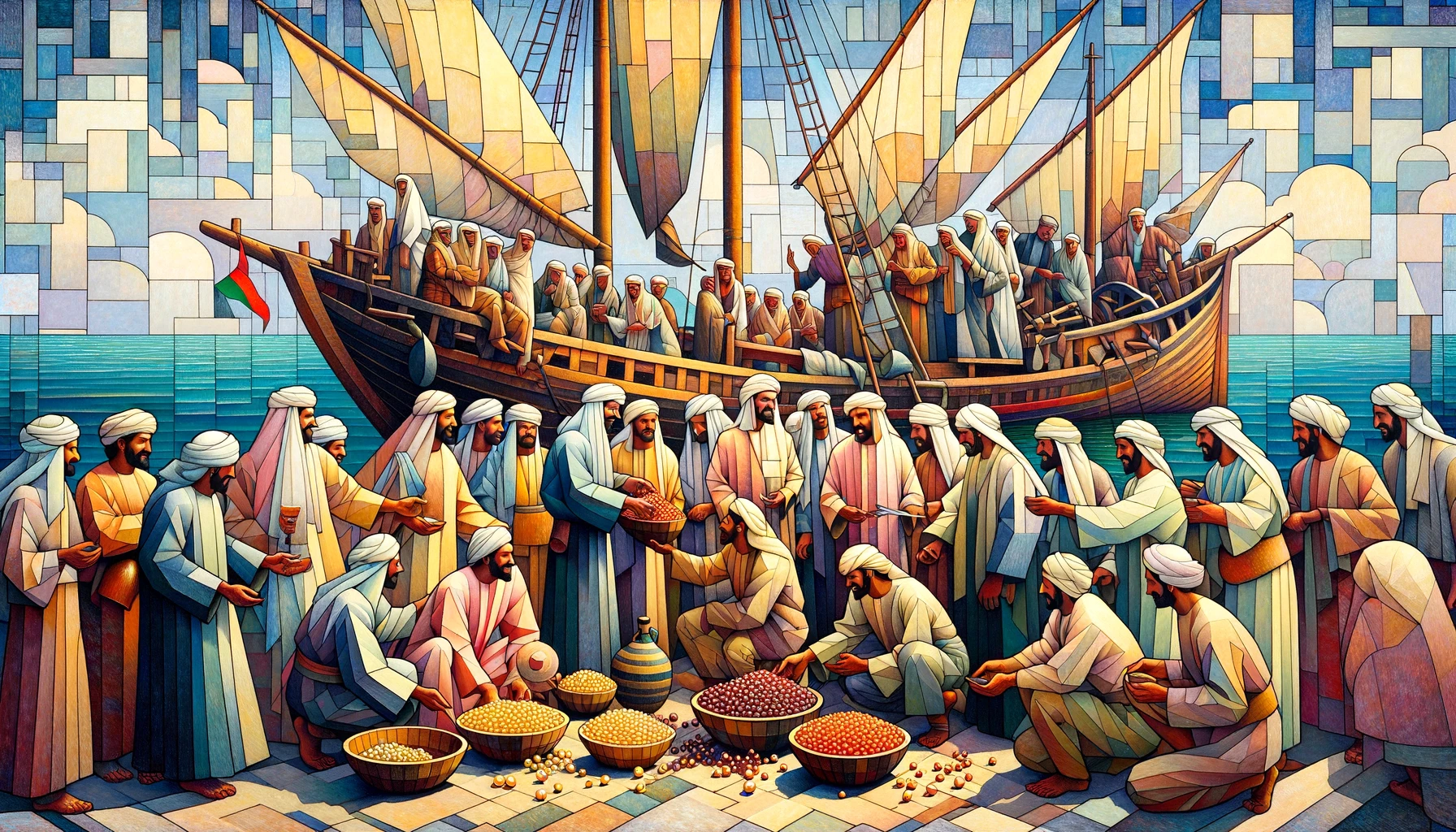In the 18th century, the Persian Gulf emerged as a critical arena for regional power dynamics, with the coastal town of Zubarah playing a pivotal role in these developments. Located in what is now Qatar, Zubarah flourished as a bustling centre of trade and pearl fishing, drawing attention from surrounding powers, notably Bahrain. The Al Khalifa family, ruling Bahrain, laid claim to Zubarah, igniting a series of conflicts with Qatar that would shape the geopolitical landscape of the region. This essay delves into Bahrain’s control over Zubarah, exploring the intricate web of military, economic, and political strategies that underscored the Bahrain-Qatar wars. Through examining key figures, places, and events, such as the rise of the Al Khalifa family, the construction of Al Zubarah Fort, and the British East India Company’s influence, we gain insight into the complex interplay of power that defined the Persian Gulf in the 18th century.
The Persian Gulf in the 18th Century
The 18th century Persian Gulf was a region of significant economic and strategic importance, acting as a nexus for maritime trade routes that connected the East and the West. Zubarah, nestled on the northwestern coast of the Qatar peninsula, emerged as a vital commercial hub during this period. Its prosperity was largely driven by the pearl industry, with the town becoming a focal point for pearl divers and traders from across the Persian Gulf, the Indian subcontinent, and beyond. The economic boom attracted various regional powers, keen on dominating this lucrative trade.
Rise of Bahrain as a Regional Power
Among these powers, Bahrain, under the rule of the Al Khalifa family, demonstrated a keen interest in Zubarah. The family’s ambitions were not merely territorial but were deeply intertwined with the desire to control the prosperous pearl fishing industry. By asserting their influence over Zubarah, they aimed to secure a dominant position in the Gulf’s economic landscape. The strategic significance of Zubarah, coupled with its wealth, made it an irresistible target for Bahrain’s expansionist policies.
Initial Settlements and Development under Bahraini Influence
The foundation and subsequent growth of Zubarah were significantly influenced by Bahraini investment and protection. Initially, the town was a small fishing village, but under the aegis of the Al Khalifa family, it rapidly transformed into a thriving trade centre. The establishment of Al Zubarah Fort by the Bahrainis served both as a military stronghold and a symbol of Bahraini power in the region. This architectural marvel not only protected the town from external threats but also played a crucial role in asserting Bahrain’s control over the area. The influx of merchants, facilitated by Bahrain’s patronage, led to a period of unprecedented economic growth and development in Zubarah.
Bahrain-Qatar Wars: The Struggle for Zubarah
The seeds of conflict between Bahrain and Qatar over Zubarah were sown from territorial disputes that escalated into military confrontations. The Al Khalifa family’s claims over Qatar, including the prosperous town of Zubarah, were rooted in a broader strategy to expand their influence in the Persian Gulf. This ambition set the stage for tension with local Qatari tribes, who were resistant to Bahraini dominance. The strategic importance of Zubarah, both as a commercial hub and as a symbol of power, made it a focal point of these disputes.
Key Battles and Strategies
The first significant clash, known as the first Bahrain-Qatar war in 1783, marked a turning point in the struggle for control over Zubarah. The Al Khalifa family launched a military campaign that temporarily secured their hold on the town, showcasing their military prowess and strategic acumen. This victory, however, was not the end of the conflict; it was merely the beginning of a series of skirmishes and battles that would continue to define the relationship between Bahrain and Qatar. The involvement of external powers, notably the British East India Company, further complicated the conflict, as their interests in the region often influenced the course of the wars.
Role of Regional Powers and External Forces
The Bahrain-Qatar wars cannot be understood in isolation from the broader geopolitical dynamics of the time. The British East India Company, seeking to protect its trade routes and maintain stability in the region, played a pivotal role in mediating conflicts and shaping the outcomes of these wars. Their treaties and agreements with Gulf sheikhdoms, including both Bahrain and Qatar, were instrumental in defining the boundaries and terms of engagement between the conflicting parties. This external influence underscored the complexity of the struggle for Zubarah, turning it into a battleground for both local ambitions and international strategic interests.
Bahraini Control Over Zubarah
Following their military successes, Bahrain took significant steps to consolidate its control over Zubarah, implementing a range of administrative and economic measures aimed at integrating the town into its territories. The establishment of Al Zubarah Fort was a clear statement of Bahraini authority, serving both as a military garrison and as a centre for administrative control. Beyond its defensive role, the fort became a symbol of Bahraini power and a base from which they could manage the town’s affairs and oversee its lucrative pearl fishing industry. Bahrain introduced systems to regulate trade and collect taxes, which not only affirmed their sovereignty over Zubarah but also significantly boosted their economic revenues.
Impact on Development, Trade, and Society
The Bahraini rule ushered in a period of prosperity for Zubarah, as the town’s strategic location and economic activities were further enhanced under their governance. The protection and patronage provided by Bahrain attracted merchants from far and wide, leading to a flourishing trade environment. The pearl industry, in particular, saw significant growth, with Bahraini oversight ensuring stability and security for the pearl divers and traders. This economic boom contributed to a vibrant society in Zubarah, marked by cultural exchanges and the development of infrastructure to support its growing population.
Resistance and Challenges to Bahraini Rule
Despite these advancements, Bahraini control over Zubarah was not without its challenges. Internal disputes within the Al Khalifa family occasionally weakened their grip on the town, providing openings for Qatari tribes to assert their claims. Moreover, the inherent tension between Bahraini rulers and local Qatari inhabitants led to periods of unrest and resistance. These challenges highlighted the complexities of maintaining control over a territory with such a diverse and dynamic population, underscoring the fragile nature of Bahraini authority in Zubarah.
Consequences of the Bahrain-Qatar Wars
The Bahrain-Qatar wars significantly altered the geopolitical landscape of the Persian Gulf region. The conflicts, spanning several decades, culminated in the establishment of more defined territorial boundaries between Bahrain and Qatar. This delineation of territories was a direct consequence of the wars, as both sides sought to solidify their claims over strategic areas, including Zubarah. The resolution of these conflicts, often mediated by external powers such as the British, laid the groundwork for the modern state boundaries we recognize today. These changes marked a shift from the fluid and often contested borders of the past to a more structured regional order.
Legacy on Bahrain-Qatar Relations
The legacy of Bahrain’s control over Zubarah and the subsequent wars has had a lasting impact on Bahrain-Qatar relations. The historical disputes over territory and influence have left a residue of mistrust and rivalry that has occasionally resurfaced in modern times. Although diplomatic and economic ties have been established, the memory of these conflicts continues to color interactions between the two nations. The struggle for Zubarah is a reminder of the deep-rooted tensions that can exist between neighboring states, even as they move forward in a cooperative regional framework.
Impact on the Local Population and the Pearl Trade
The wars and Bahraini control over Zubarah had profound implications for the local population and the pearl trade, which was the economic lifeblood of the region. The conflicts disrupted traditional pearl fishing operations, leading to economic instability and hardship for many who depended on this industry. Moreover, the shifting control of Zubarah resulted in population displacements, as individuals and families were caught in the crossfire of the territorial disputes. Despite these challenges, the pearl trade continued to be a vital economic activity, albeit under the changing auspices of Bahraini, and later Qatari, control. The resilience of the pearl trade is testament to its importance to the Gulf’s economic and cultural heritage, enduring through periods of conflict and transformation.
Conclusion
The intricate tapestry of Bahraini control over Zubarah in the 18th century, woven through the fabric of military conflicts, economic strategies, and geopolitical manoeuvrings, has left an indelible mark on the history of the Persian Gulf region. The Bahrain-Qatar wars not only reshaped the territorial boundaries but also influenced the socio-economic and political dynamics between these two Gulf states for centuries to come. As we reflect on the events that unfolded in Zubarah and their ramifications, it becomes evident that the history of this small yet significant town offers profound insights into the broader narratives of power, resistance, and identity in the Persian Gulf.

